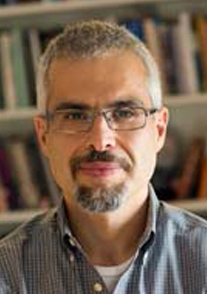Bogac A. Ergene
Posted on June 01, 2015
Boğaç A. Ergene is currently Associate Professor of History at University of Vermont. In the Spring Semester of 2014, Ergene was the Aga Khan Distinguished Professor in Islamic Humanities at Brown University. He is one of the co-editors of the Brill book-series, “the Ottoman Empire and Its Heritage.” At the University of Vermont, Ergene served as the director of Middle East Studies Program and the Director of Graduate Studies in the History Department.
Ergene has undergraduate and graduate degrees in Economics (BSc, 1992 and MSc,1995; Middle East Technical University) and Economic History (MSc, 1993; London School of Economics and Political Science). He received his PhD degree in History from the Ohio State University in 2001. Ergene is the author of Local Court, Provincial Society and Justice in the Ottoman Empire: Legal Practice and Dispute Resolution in Çankırı and Kastamonu (1652–1744) (Boston and Leiden: Brill, 2003) and editor of Judicial Practice: Institutions and Agents in the Islamic World (Leiden and Boston: Brill, 2009). In addition, he published articles in major history, law, and economic history journals, including International Journal of Middle East Studies, Journal of Economic History, Economic History Review, Journal of Family History, Journal of Interdisciplinary History, Law and Social Inquiry, Islamic Law and Society, and Continuity and Change. Ergene’s research has received support in the past from many institutions, including the American Council of Learned Societies, Social Sciences Research Council, and American Research Institute in Turkey. At the University of Vermont, his teaching and research accomplishments were recognized by the College of Arts and Sciences prestigious Dean’s Lecture Award. Ergene has recently completed a long-term research project on “Law and Economics” in the Ottoman Empire (with Metin Coşgel). The book-length manuscript based on this research (provisionally titled, A Court in Time) is currently under review for publication.
Ergene and Febe Armanios will work on a joint project exploring the evolution of halal food (food that is Islamically permissible) dictums and practices in the Islamic tradition, more specifically, how Muslim jurists—from medieval to modern periods—have negotiated and reinterpreted understandings of halal to address a variety of internal and external challenges. Halal food traditions have been at the center of belief and practice within Islamic history, from the religion’s rise up to the present. What to eat, what to avoid, restrictions on alcohol, smoking, or coffee, and so on served to distinguish Muslim communities from other religious groups and to imprint religion in the daily lives of believers. In their project, Ergene and Armanios investigate categorical associations of halal practice as embedded in the Qur’an, ahadith, as well as jurisprudential sources. They will explore dietary provisions such as those governing alcohol consumption, the prohibition of the pig, animal slaughter, and butchery. Their research into legal sources will be supplemented by historical chronicles and travel accounts, as well as modern legal discussions and constitutional interpretations.

